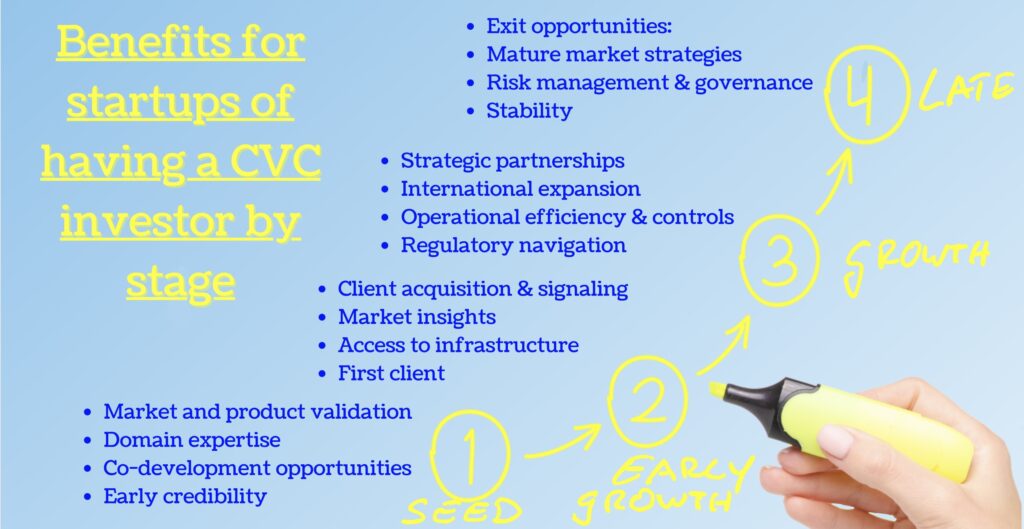
Startups with corporate investors are more successful than startups without corporate backing. A market analysis of pitchbook data conducted by Global Corporate Venturing showed that having a corporate investors halves the chance of a startup going bust and increases the exit multiple.
#CorporateVentureCapital (CVC), which involves equity investments sourced from established corporations, offers unique advantages from my perspective that are worth assessing as startup when identifying and selecting the best funding options. The individual advantages depend for example on the existing cap table, the nature of the business (B2C, B2B, etc.), and are phase-specific. Below, I delineate the benefits beside capital as well as shortcomings of CVC for startups, from seed to late stage:
1. (Pre-)Seed Stage (Product and Market)
During the earliest stage, the key objectives for startups are to refine the product and discover market fit. In this stage, CVC can offer several benefits:
- Market and product validation: Collaborating with a CVC can offer unparalleled insights into the industry incl. market needs and product knowhow, providing the startup with a healthy competitive advantage and a more targeted approach to product development.
- Domain expertise: Corporate investors can provide insights specifically tailored to the startup’s industry and product. Given their decades of experience in the sector, corporates possess deep domain knowledge that can guide startups in avoiding common pitfalls. This could include regulatory or compliance know-how, particularly relevant in regulated industries.
- Co-development opportunities: Corporates may be interested in joint product development, offering a quicker route for startups to test and refine their product. Corporates could also provide access to use cases, research labs, data, or even clients for testing early products.
- Early credibility: Association with a well-known corporate name can bring a level of trust and validation to a young company, which can help when attracting talent, partners, and other investors.
2. Early Growth Stage (Go-to-Market)
Upon maturing beyond the seed stage and having a clearly defined product and market, the startup focus shifts to go-to-market strategies and initiating scale-up activities. Having a CVC as a strategic investor could bring several benefits across several dimensions:
- Client acquisition & signaling: CVC can “open doors”, either directly through introductions to its corporation’s clientele or indirectly as a signal to the market by having the corporate back the startup. This can be a game-changer, particularly for B2B startups.
- Market insights: Corporates operating in similar or complementary industries can provide startups with market insights, including go-to-market strategies, competition, market changes and pitfalls.
- Access to infrastructure: Corporate investors can grant startups access to their infrastructure, be it sales channels, manufacturing units, or supply chain resources. This can provide a competitive advantage in sales & distribution and could lower operational costs.
- First client: Corporates can act as the first anchor client, adding not only revenue but also signaling positively to other prospects. Having previously engaged in design partnerships during the seed phase can further accelerate the first client adoption.
3. Growth Stage (Scaling)
It’s time to scale exponentially, with the objective of gaining market share by leveraging the developed product advantages and gained go-to-market expertise. At this stage, there are several benefits of adding/having a CVC investor at the cap table:
- Strategic partnerships: This is the stage where synergies between startups and corporate investors can be fully realized. Strategic partnerships can be formed to co-launch products, integrate services enterprise-wide, or expand into new verticals.
- International expansion: As startups look beyond domestic markets, a global corporate partner can provide vital insights, contacts, and infrastructure to facilitate international growth.
- Operational efficiency & controls: With increasingly complex operations, startups can leverage the best practices, HR policies, and operational insights from their corporate investors.
- Regulatory navigation: Corporates, having dealt with various regulatory landscapes, can guide startups in navigating these waters, especially when entering heavily regulated industries or new regions.
4. Late Stage (prepare exit)
At the late stage, venture-backed startups often look at potential exits, whether through acquisitions, mergers, or public offerings. CVCs can offer unique value at this stage:
- Exit opportunities: As startups mature, they often become acquisition targets. A CVC affiliation can streamline this process. In some cases, the corporate investor itself becomes the acquirer.
- Mature market strategies: Corporates can provide insights into maintaining growth when market saturation is nearing or how to fend off new entrants.
- Risk management & governance: With their years of experience, corporates can guide startups in better risk assessment and governance.
- Stability: Late-stage startups aiming for an IPO or looking to solidify their market position can leverage the financial stability and industry presence of their corporate backers to reassure stakeholders, investors, and customers.



